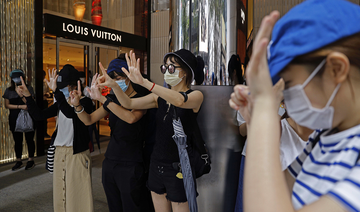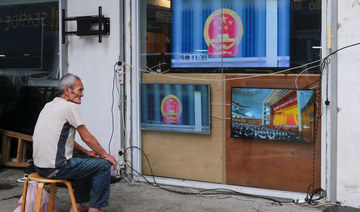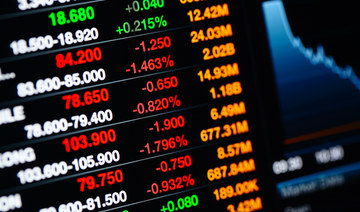HONG KONG: A national security law proposed by China could imperil Hong Kong’s status as one of the world’s best places to do business.
The law, approved Thursday in Beijing, led Secretary of State Mike Pompeo to say Washington will no longer treat Hong Kong, already reeling from anti-government protests and the pandemic, as autonomous from Beijing.
The Chinese government has not given details of the law, which is aimed at suppressing secessionist and subversive activity in the former British colony.
After 11 months of protests, Chinese leaders say it’s needed to combat unspecified threats in the semi-autonomous region of 7 million people. But business groups, lawyers and financial analysts say potential repercussions range from loss of business for Hong Kong’s financial markets and law firms to travel restrictions on its residents.
Hong Kong is highly regarded for its skilled workforce, business-friendly legal system, Western-style free speech and ease of movement. But global companies already were shifting some operations out of Hong Kong due to rising costs and uncertainty after prolonged, sometimes violent clashes between police and pro-democracy protesters.
Scott Salandy-Defour, founder of clean-tech startup Liquidstar, has been considering moving out of Hong Kong, and the security bill is the “last straw,” he said. “I don’t see how it gets any better from here.”
“When we say we’re a Hong Kong-based company when talking to investors, it’s just not as attractive as it was as a year ago,” said Salandy-Defour, whose company provides sustainable battery rental and charging services for developing countries.
“We’re potentially cutting ourselves off from a lot of different funding avenues, like grants from the US government,” he said.
Hong Kong’s leader Carrie Lam has tried to reassure companies and the public that its civil liberties won’t be affected. But the law shows Chinese President Xi Jinping is determined to tighten control.
“Hong Kong is riskier than it used to be,” said Tara Joseph, president of AmCham Hong Kong. “There is a big worry that there are two buses careening toward each other, and that’s the US and China, and that this could have a profound impact in Hong Kong,” Joseph said.
Critics say the law undermines the “high degree of autonomy” promised when Britain handed control to China in 1997. That autonomy meant Washington and other governments have treated the city as a separate territory for trade, travel and other affairs.
Secretary of State Mike Pompeo said Wednesday those changes are significant enough that Washington will no longer treat Hong Kong as autonomous.
The loss of Hong Kong’s trade privileges could mean Hong Kong identity card holders might lose their ability to visit the United States without applying for a visa in advance. Washington also could revoke its promise to exchange Hong Kong dollars for US dollars, potentially disrupting the city’s financial system, Deutsche Bank economist Michael Spencer said in a report.
The financial sector would take a big hit if companies such as MSCI reclassify Hong Kong as an emerging market like Shenzhen and Shanghai instead of a developed market, Spencer said.
“A very large share of capital invested in the Hong Kong market will have to leave,” he said.
Hong Kong’s uncertain future is putting it at a disadvantage with other Asian destinations that are competing to attract foreign investment, such as Singapore and Tokyo.
“Over time, people get nervous, and think that this place may not be, my money may not be, as safe as it once was, and I’m going to think about going somewhere else,” said William Reinsch, senior adviser at the Center for Strategic and International Studies. “It sends a signal that Hong Kong is no longer a safe and reliable place to put your money or to do business.”
The national security law has added to worries that Hong Kong’s legal system is losing its independence. The Hong Kong Bar Association says the method for enacting it is a threat: China is circumventing the territory’s legislature by changing its mini-constitution, the Basic Law, to require its government and courts to enforce security measures, regardless of what local lawmakers decide.
Beijing has shown little regard for such considerations, said Reinsch.
“China is not a rule-of-law state, it’s a state where the party makes decisions about what’s going to happen, those are arbitrary decisions, and if that’s what’s going to happen in Hong Kong, it doesn’t bode well for the economy or for the people,” he said.
Bob Broadfoot, managing director of Hong Kong-based research firm Political and Economic Risk Consultancy, said companies might shift legal work to Singapore or other countries.
“Singapore’s going to get more business as a dispute resolution center,” said Broadfoot. “Its legal system, which is a bigger earner, will benefit from Hong Kong’s problems.”
Hong Kong’s troubles and broader global economic uncertainty due to the pandemic also may make it harder for businesses there to attract and retain talent.
Still, some experts believe the concerns over a possible loss of Hong Kong’s special status are overblown.
Many big companies have sizable operations in both the mainland and Hong Kong, and most of Hong Kong’s manufacturing base shifted to China years ago, said Nicholas Lardy, a fellow at the think tank Peterson Institute for International Economics.
“The real economic consequences are fairly limited,” Lardy said.
Hong Kong is still an attractive base for many companies, said Andrew Bishop, a partner with Signum Global Advisers, a risk advisory firm.
Last year’s protests gave businesses time to think, he said.
“At this point, continuing operations in Hong Kong has become a matter of careful calculation rather than a gut reaction to a surprise shock.”
Hong Kong’s business hub status imperiled by security law
https://arab.news/rgz4k
Hong Kong’s business hub status imperiled by security law
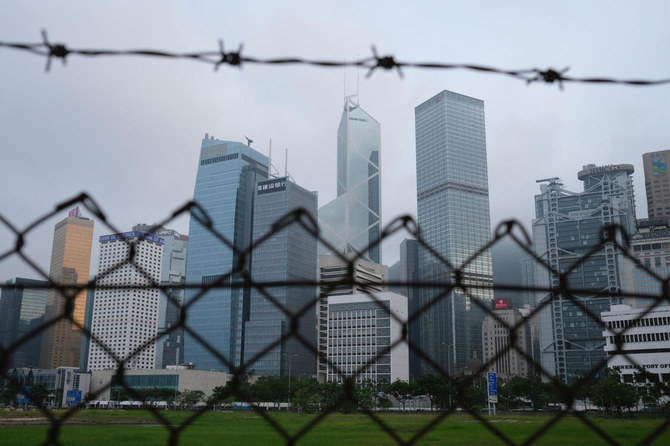
- Chinese government has not given details of the law
- Legislation aimed at suppressing secessionist and subversive activity
Saudia unveils beta version of new Travel Companion platform
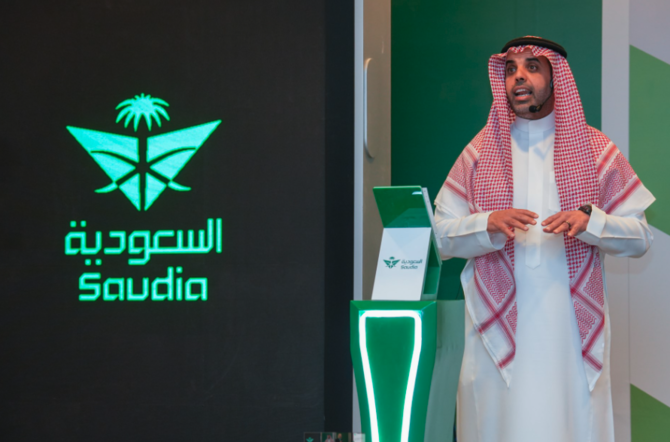
RIYADH: The Kingdom’s flagship airline Saudia has launched a beta version of its digital platform, the Travel Companion, powered by advanced artificial intelligence, aiming to transform the industry.
The new initiative, unveiled during a special event, is part of a two-year plan developed in partnership with global professional services firm Accenture.
“This platform, resulting from our ongoing collaboration with Accenture, signifies our forward-looking approach to providing guests with unparalleled convenience and flexibility,” the Director General of Saudia Group, Ibrahim Al-Omar, said.
The main objective of this launch is to transform how travelers engage with the airline and establish new benchmarks for digital travel.
TC, initially named, offers personalized and tailored solutions to meet individual preferences and needs, providing search results from trusted and authenticated sources and incorporating visual aids in its responses.
The interface is designed as a comprehensive, one-stop solution that enables users to book concierge services, including hotels, transportation, and restaurants, as well as activities and attractions, without the need to switch between multiple platforms.
“This is a beta version. This is not the product. We will keep enhancing and developing it,” Al-Omar stressed.
Moreover, it establishes seamless connections with transportation platforms and various train companies, ensuring a smooth and uninterrupted journey.
Commenting on the new announcement, Chief Data and Technology Officer at Saudia, Abdulgader Attiah, told Arab News: “It’s like having the VVVIP concierge service at your hand. For public, it’s not any anymore VIP service. It’s not a paid service. You have it for free, and it will give you all what all kind of services that VVIP service would provide to you, so it’s your private concierge.”
He added: “We will be the anchor for the travel industry. We are not anymore, an operator for an airline, but with this app, you will be an anchor for all tourism ecosystem in a single app, so everyone can collaborate in this app, and having the links, so you don’t need to communicate with any other party, so through this app, you can communicate to all travel ecosystem.”
In future phases, Saudia plans to add more features, including voice command and digital payment solutions.
“Once we add the complete solution we will add the more services, which is we call it the concierge services; booking for hotels and transportation and the restaurants, all of these ones is done during the, next two years, and this is the complete life cycle of the, vision we have today,” Attiah told Arab News.
He added: “If you want to develop this app, five years back, it would take three, four years. Today, we have developed only in seven, eight months. To that from the inspirational part to having an actual booking, we started back in June and now we are live.”
Attiah also underlined that Saudia is the first airline in the world to implement a GenAI-based chatbot that can perform end-to-end actions, meaning it can not only engage in conversation but also execute tasks or actions based on user requests.
With an always-on Travel Companion available through a telecom e-SIM card provided by Saudia, users can stay connected globally without relying on additional internet providers.
Furthermore, users can purchase data packages for extended use, guaranteeing continuous access to the platform’s services.
Saudi economy witnessing a fundamental shift, says minister

RIYADH: Since the launch of Vision 2030, Saudi Arabia has witnessed a fundamental shift in its economy and the business environment is transforming with the creation of new sectors, said the Kingdom’s economy minister.
Faisal Al-Ibrahim was speaking at a conference in Riyadh on Wednesday during which he highlighted the fast-evolving business landscape of the Kingdom focused on diversifying its income sources away from oil.
Speaking at the event titled “Industrial policies to promote economic diversification,” the top official said there have been fundamental changes in the legislative and economic regulations to promote sustainable development since the launching of the Vision 2030 plan.
He said the Kingdom’s efforts to diversify its economy have led to the creation of new sectors due to the initiation of several megaprojects such as NEOM, the Red Sea, and others.
“We stand at a crossroads to change the global economy,” Al-Ibrahim said.
He stressed the need for strategies to ensure a flexible and sustainable economy.
“The presence of foreign investments will develop competitiveness in the long term,” the minister affirmed.
The minister also highlighted how the Kingdom was working in the medium term to focus on transforming sectors that represent a technological shift.
Saudi Arabia is keen on achieving development in the medium term by balancing short-term profits and promoting long-term success, Al-Ibrahim highlighted.
Since the launch of the vision, the Ministry of Economy and Planning has conducted several economic studies aimed at diversifying the economy by developing objectives for all sectors, raising complexity levels, and studying emerging economies to enhance the Kingdom’s capabilities.
Saudi Arabia closes April sukuk issuance at $1.97bn
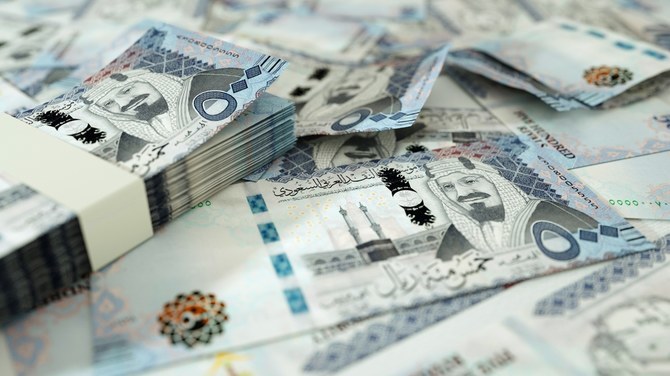
RIYADH: Saudi Arabia has completed its riyal-denominated sukuk issuance for April at SR7.39 billion ($1.97 billion), representing a rise of 66.44 percent compared to the previous month.
The National Debt Management Center revealed that the Shariah-compliant debt product was divided into three tranches.
The first tranche, valued at SR2.35 billion, is set to mature in 2029, while the second one amounting to SR1.64 billion is due in 2031.
The third tranche totaled SR3.51 billion and will mature in 2036.
“The Kingdom also plans to expand funding activities during the year 2024, reaching up to a total of SR138 billion from what has been stated previously in the Annual Borrowing Plan, with a portion of this amount already covered up to date,” said NDMC in a press statement.
It added: “This step comes with the aim of capitalizing on market opportunities to achieve proactive financing for the coming year and utilizing it to bolster the state’s general reserves or seize additional opportunities to enhance transformative spending during this year, thereby accelerating strategic projects and programs of Saudi Vision 2030.”
In March, NDMC concluded its second government sukuk savings round for March, with a total volume of requests reaching SR959 million, allocated to 37,000 applicants.
The center added that the financial product, also known as Sah, offers a return of 5.64 percent, with a maturity date in March 2025.
Earlier this month, Fitch Ratings, in a report, said that global sukuk issuance is expected to continue growing in the coming months of this year, driven by funding and refinancing demands.
The credit rating agency noted that various other factors like economic diversification efforts by countries in the Gulf Cooperation Council region and development of the debt capital market will also propel the growth of the market in the future.
In January, another report released by S&P Global revealed that sukuk issuance worldwide is expected to total between $160 billion and $170 billion in 2024, driven by higher financing needs in Islamic nations.
The report noted that higher financing needs in some core Islamic finance countries and easing liquidity conditions across the world are two crucial factors which will drive the growth of the market this year.
Closing Bell: TASI edges down to close at 12,355 points
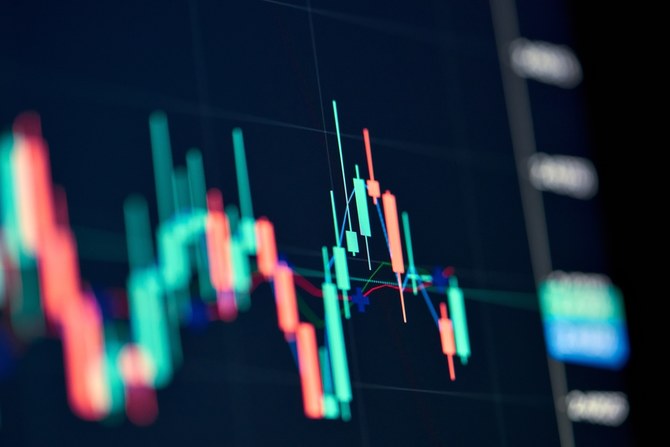
RIYADH: Saudi Arabia’s Tadawul All Share Index dipped on Wednesday, losing 128.72 points, or 1.03 percent, to close at 12,355.69.
The total trading turnover of the benchmark index was SR8.45 billion ($2.25 billion) as 41 of the listed stocks advanced, while 187 retreated.
Similarly, the MSCI Tadawul Index decreased by 14.78 points, or 0.95 percent, to close at 1,548.62.
Also, the Kingdom’s parallel market Nomu dipped, losing 365.84 points, or 1.37 percent, to close at 26,326.12. This comes as 17 of the listed stocks advanced, while 45 retreated.
The best-performing stock of the day was Al-Rajhi Co. for Cooperative Insurance as its share price surged by 9.87 percent to SR138.
Other top performers include Al Sagr Cooperative Insurance Co. and First Milling Co., whose share prices soared by 6.38 percent and 5.63 percent, to stand at SR35.85 and SR78.80, respectively.
In addition to this, other top performers included Batic Investments and Logistics Co. and Saudi Research and Media Group.
The worst performer was Al-Baha Investment and Development Co., whose share price dropped by 7.14 percent to SR0.13.
Other weak performers were National Co. for Learning and Education as well as Arriyadh Development Co., whose share prices dropped by 5.95 percent and 5.91 percent to stand at SR148.60 and SR22.60, respectively.
Moreover, other subdued performers also include Red Sea International Co. and AYYAN Investment Co.
On the Kingdom’s parallel market Nomu, the best-performing stock of the day was Osool and Bakheet Investment Co., as its share price surged by 12.05 percent to SR40.90.
Other top performers on Nomu include Arabian Plastic Industrial Co. and Lana Medical Co., with their share prices soaring by 7.42 percent and 3.59 percent, respectively, reaching SR37.65 and SR41.85.
The worst performer was Jahez International Co. for Information System Technology, whose share price dropped by 5.88 percent to SR32.
Other weak performers were Alhasoob Co. as well as Aqaseem Factory for Chemicals and Plastics Co., whose share prices dropped by 3.61 percent and 3.38 percent to stand at SR64.10 and SR62.80, respectively.
On the announcements front, HSBC Saudi Arabia, serving as sole financial advisor, joint bookrunner, underwriter, and lead manager, has announced the intention of Dr. Soliman Abdel Kader Fakeeh Hospital Co., known as Fakeeh Care Group, to proceed with its initial public offering on the main market of Saudi Exchange.
According to a statement, the offering will include 49.8 million ordinary shares, with 19.8 million existing shares and 30 million new shares upon completion.
This offering is set to represent 21.47 percent of the company's share capital post-capital increase.
Saudi Exchange and the Capital Market Authority approved the listing and IPO, respectively, with the pricing of shares to be determined after the book-building period.
Ministry tenders contract for expansion of Prince Faisal bin Fahd Stadium
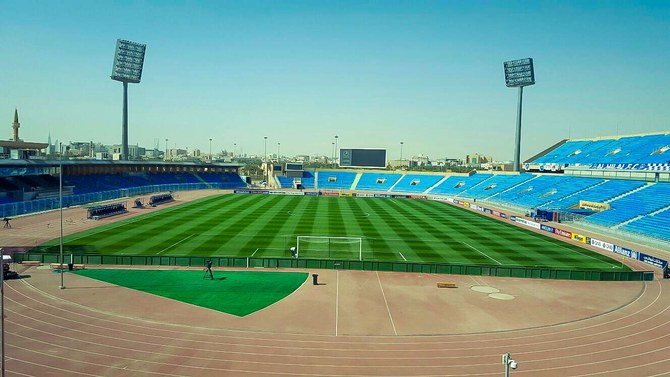
RIYADH: Saudi Arabia’s Sports Ministry has tendered a contract to boost the capacity of Riyadh’s Prince Faisal bin Fahd Stadium to 45,000 seats up from its current 22,188.
The expansion project comes as the Kingdom prepares to host the Asian Football Confederation Asian Cup in 2027, reported MEED.
This initiative aligns with Saudi Arabia’s plan to build sports stadiums under its SR10.1 billion ($2.7 billion) capital projects program.
The ministry requested proposals on April 8 and expects to receive bids on June 14.
In April, the ministry also tendered an early works contract for the expansion and development of the Prince Mohammed bin Fahd Stadium in Dammam.
At the time, the scope of the contract included the stadium’s decommissioning, demolition, and bulk excavation, as well as the relocation and setting up of related facilities.
In July 2023, the ministry invited firms to submit pre-qualification documents for the main construction contracts for the schemes in the capital projects program.
The undertakings, which are set for completion before the 2027 AFC Asian Cup, entail increasing the capacity of King Fahd Stadium in Riyadh to 92,000 seats and boosting the seating capacity of Prince Mohammed Bin Fahd Stadium to 30,000 seats.
It also includes increasing the seating capacity of the Prince Saud bin Jalawi Stadium in Al-Kahir to 45,000 and building a sustainable New Riyadh Stadium north of the city with 45,000 seats.
Another main element of the ministry’s projects program is the construction of as many as 30 new training grounds and facilities in proximity to the stadiums that will be used for the 2027 competition.
Construction on the projects is expected to start in July 2024 and scheduled to be completed by December 2025.
A total of 18 facilities will be ready in time for the 2026 AFC Women’s Cup.



